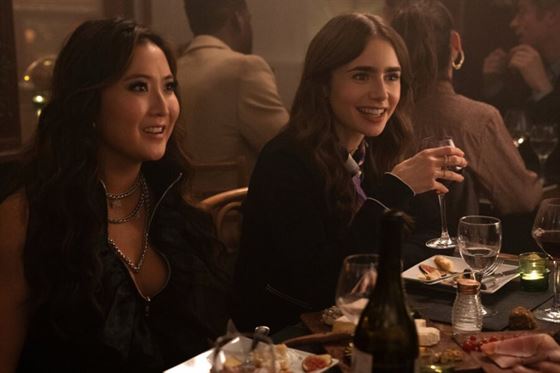The romantic backdrop of Paris, attractive French men and a successful businesswoman are the perfect ingredients for a feel-good show.
One of Netflix’s newest and most popular series, “Emily in Paris,” entices viewers with the promise of all these elements, but fails to use them all to their full potential.
Lily Collins plays Emily Cooper, an American woman who works for a marketing firm in the United States. The show kicks off with Emily being transferred to an office in Paris for a temporary position in place of her boss.
“Emily in Paris” was created by Darren Star, known for creating television shows such as “Sex and the City,” “Beverly Hills, 90210” and “Younger.”
“The show [is] so much about the [French] culture undermining her expectations of how things are and how things seem,” Star said in a recent interview with E! News. “And everything will not be as it seems. It’s always about challenging her American worldview. We certainly have a lot of forks in the road and a lot of places to go.”

Mindy Chen (Ashley Park) accompanies Emily Cooper (Lily Collins) to dinner.
Photo courtesy of Netflix
The first season of “Emily and Paris,” which premiered on Oct. 2, does not reflect Star’s statement. Rather, Emily’s worldview is not challenged in the series at all.
For instance, episode seven is called “French Ending,” and in one scene, characters Luc, played by Bruno Gouery, and Julien, played by Samuel Arnold, explain to Emily that a French ending is “tragic.” Luc goes on to criticize American romantic comedies about their happy and dishonest endings.
In the same scene, the three characters have a discussion about escapism versus realism in film. Emphasis is then placed on Luc and his argument for realism, giving the idea importance. The conversation ends with Luc sending a strong message:
“Thinking you can escape life is your problem,” he said. “You can never escape life, never.”
While episode seven might be a bit late to do so in the 10-episode series, viewers may interpret his statement as foreshadowing that the plot could potentially take a turn. The episodes beforehand show Emily fixing every problem that she creates and never truly facing repercussions. This contributes to why her character does not possess a story arc.
The rest of the show continues to be exactly what episode seven criticizes.
If escapism is the direction that Star is choosing to go toward, Emily could still go through tribulation without undermining the romanticism of the series. Viewers are not asking for Emily to be tormented, they simply want a character that grows. The show can also benefit if tension was not broken by predictability.
Another key element to the series are the men Emily encounters. While she handles them well, there could still be improvement on how they are used to advance the plot.
Emily stands up for herself and shows self-respect in multiple scenes when certain men make her feel uncomfortable, and this should not change. However, as of the end of the first season, a man is the only tension the show has which puts her in a difficult position with a friend.
With so many opportunities for Emily to be presented with a challenge and a chance to change, it is unfortunate that the one that is used is the cliché of a man getting between two friends.
As far as the culture goes, the show fails to recognize more than the stereotypical French culture.
The aforementioned discussion of a French ending is the most Emily learns about French culture. Everyone around Emily, except for her friend Mindy Chen, played by Ashley Park, is French, suggesting it should be very easy for her to understand more about the culture.
While wine tastings and film endings is a start, a deeper evaluation of the history and customs of France would ensure it is being fully taken advantage of.
A renewal for season two of “Emily in Paris” gives production a chance to flesh out its storylines. Hopefully, this means that the next season will bring an even better Emily.




